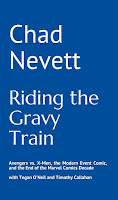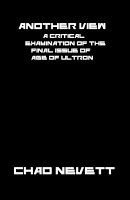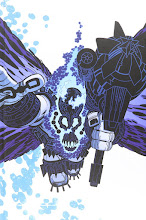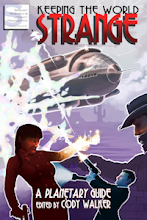[
The bookstore at my former university has a lovely sale on a wide variety of Marvel trades, so I've been buying them. And discussing them here. On Mondays. Awesome.]

I just want to say that aside from the
Ultimate Team-Up collection, I don't plan on getting any further Ultimate books at the bookstore sale. I'm planning to keep on buying
Ultimate Spider-Man in hardcover and want to get a copy of
Ultimate Fantastic Four vol. 3 (the only volume the bookstore doesn't have, of course!), but this does it for me. I was tempted to maybe pick up some of Mike Carey's
Ultimate Fantastic Four run to see what Ultimate Thanos is like, but I'll pass. No big reason for this decision other than... well, not wanting those other comics. If someone makes an extremely convincing case, I'll change my mind, maybe. But, that said, let's get on with...
Ultimate X-Men: Ultimate Collection Vols. 1-2, and Ultimate X-Men Vols. 5-6I really do wish these comics had lived up to their potential. Mark Millar certainly tries--in fact, I would say that his
Ultimate X-Men work seems like his most genuine attempt to write something intelligent, and thought-provoking that will last beyond the initial KICKSPLODE! factor. Of course, it doesn't, because, try as he might, Millar can't escape the KICKSPLODE! and that becomes the point of the book. Also, he just doesn't have the skills to really play above that level.
Actually,
Ultimate X-Men suffers from a problem that most writing about "superior" beings does: the writer isn't more intelligent than the rest of us. One of the conceits of this book is that mutants are the next step in evolution and, at one point, Xavier even suggests are naturally more intelligent than humans, just as humans are more intelligent than other primates. None of this so-called advanced intelligence is ever really displayed, though, beyond some cool gadgets and the transformation of the Savage Land... the ideas displayed by Xavier and Magneto are the same old dichotomy we've always seen in X-Men comics, and I was left wondering, constantly, if these are supposed to be the next step and are so brilliant, how come they're stuck in this horribly childish "black and white" argument?
Now, it seems Millar may be making the argument that these characters aren't more advanced, really. For all of their bluster, they're just humans with superpowers trying to play above their level and convince themselves that, somehow, they're better. But, honestly, that's boring. That is so dreadfully boring! And, it just becomes frustrating, because no one calls them on it. Okay, that isn't exactly right: they are called on it, kind of, at various points, but those who make the point always then forget their objections and
pick a side to fight on. In the third storyarc, Colossus quits the group and goes back to Russia to work and support his family, no longer interested in Xavier's pacifist ideals, but also not interested in the Brotherhood's terrorist ideals. It's the one moment of almost original thinking in the book: there are more than two options! But, soon thereafter, Colossus saves a distressed sub and rejoins the group.
Every character in the book is only capable of seeing things in terms of black and white, with us or against us... and there's nothing wrong with that, but Millar hides that horribly cynical and depressing worldview under the guise of optimism and hope. It's the opposite of Warren Ellis's writing, which is optimistic and hopeful, but hidden under cynicism, which I'll take every day of the week over Millar's style.
The first story is titled "The Tomorrow People," but what's so damn futuristic about them? Not a goddamn thing. Take Forge, for example: his mutant power is that he can make anything he can think of. And what does he do? He makes a machine that will amplify Magneto's powers. Why not make a machine that eliminates prejudice against mutants? Or a machine that evolves everyone on the planet AND makes them okay with that? Or, I don't know... but something that actually goes beyond fucking hitting things?
Paul O'Brien explains the problem in his
review of Ultimate X-Men #1: "It also raises right off the bat the fundamental problem that the X-Men as a concept doesn't want to be in a shared universe, and never did. The X-Men wants to be doing stories about global society being transformed by the arrival of a new stage in evolution. But it can't do that because if you transform Marvel's Earth, it'll no longer be providing the appropriate "real world" backdrop for all the other series. The X-books have ended up dealing with that by holding out the vague promise of the Days of Futures Past apocalypse in the future, and running towards it on a treadmill, continually claiming that we're getting closer when in fact no signs of that are ever apparent and we all know it could never happen." Really, there's no way to tell a truly intelligent and forward-thinking story using mutants at Marvel, because there is no way to change the world in any meaningful way at Marvel. Superficial changes will happen, but to really explore the concept of mutants, you have to be free to break out of this constant give-and-take between hating and loving mutants. So, was Millar's run a failure because of him or because of the limitations upon him? I think it's because of him, but I'm sure the limitations didn't help.
Then there's the limitation of the writer (the concept of the writer)... Look at Morrison's run on
New X-Men (which started the same week as
Ultimate X-Men #6, coincidentally): Morrison kept hinting at these fantastically advanced ideas of Xavier and mutants, in general, but did anything come of it? Is so-called mutant culture ever anything that different? Are Xavier's conceptions of a mutant school really anything that advanced? At their core, it's really just a more open school where students are allowed to pick and choose what they'll study a bit more and traditionally non-academic areas are given more emphasis... it's certainly progressive compared to public schools, but is is progressive compared to human ideas? The biggest flaw of writing of this type is that it is almost impossible to accurately write someone who is supposed to be that much more advanced than you are. It's why Q and Data on
Star Trek: The Next Generation never really seemed believable to me. Q is supposedly omniscient... but doesn't act like it. Or, Data is capable of 60 trillion operations per second, but often has to pause in order to look up a word in his memory banks?
Really? Now, the reason for this is so the character is more relatable and the audience can see his capabilities, but it always comes off as artificial (and, yes, my problem with the android character is that he's not portrayed realistically). I don't blame the creators for these problems, because how does one realistically write an android or a god or a telepath? How can one realistically write someone whose experience is not just different from ours, but as different from ours as ours is from that of a monkey? Under the premise that mutants are the next evolutionary step, trying to understand how a mutant would think is like a monkey trying to understand how humans think.
But, shit, it's like Millar doesn't even try.

Look at the Ultimate line objectively and ask yourself, "Shouldn't these comics be better?" Seriously. These are relaunches of decades-old characters with decades of stories to draw upon in addition to the imaginations of the writers attached to the comics and... shouldn't these comics be better? Really, shouldn't these be the best X-Men comics? Shouldn't the portrayals of these characters be inspired by the best versions? Of course, that raises the question of which version (and even which characters) are the best, but... somehow, I just keep looking at these Ultimate books and wondering if they should be better. (Except for Ultimate Tony Stark... he is the only character that seems to be the best version of the character so far. Maybe Ultimate Hulk, too. Really,
Ultimate Human seems to be the best Ultimate book I've ever read, in retrospect...)
Then again, maybe these books are limited by their awareness. There's always an awareness that there are other versions and that maybe, just maybe, things could be better. Or, how does Millar's X-Men compare to Chris Claremont's? Or to Grant Morrison's? How about the Bendis/Bagley Peter Parker and the Lee/Ditko Peter Parker? Is it a matter of spontanaity versus contemplation and preparation? (I mean, would it be better if I'd planned out this post ahead of time, or does it benefit more from my making it up as I go?)
I'm sorry if this seems meandering, but I'm just trying to figure out why these 35 comics (plus two issues by Chuck Austen and one by Geoff Johns... but those don't count) aren't better. Why aren't they the
ultimate X-Men story? Does such a thing exist, really? And, if not, is the Ultimate line a failure automatically?
(Because I just mentioned it, I'll say a few words about the Chuck Austen and Geoff Johns contributions. I started reading both, but quickly started to skim instead, because they're not that good. Johns's contribution takes place between issues six and seven, and goes against established continuity to make a point that isn't really followed up in later issues. Austen's story involves Gambit, which is strike two against it--the first being Chuck Austen's involvement. And before anyone gets all uppity about me bashing Austen, I want to say that I hated Austen's writing before it became fashionable to hate Austen's writing. It was so annoying when everyone else started hating it, too, because, then, my unique opinion which I formed all by myself suddenly seemed like an attempt to be just like the cool kids. You always think you want everyone to agree with you, but you don't. Much better to stand outside the crowd. But, yeah, it's a serviceable story about Gambit being a rogue with a heart of gold as he helps out a little girl--that the trade identifies as a little boy on the back cover for some reason--against Ultimate Hammerhead. It's not really bad, it's just not that good. And since it doesn't relate to Millar's story at all, it's not worth discussing here.)
But, all of that aside, I should probably examine the comics themselves, shouldn't I? It's all one big story, really, which is rather impressive. Millar does manage to bring in various elements from the X-universe to tell one cohesive story, and it does work well as one story. Now, whether or not the individual stories work well in that regard is a whole other problem, because they don't. If you want to read Mark Millar writing the X-Men, you need to buy all six volumes to really get anything out of it, but that's pretty similar to the Ultimate line as a whole (a simultaneous strength and weakness). Even the two middle stories, "Return to Weapon X" and "World Tour" serve the larger story, which is really about the competing ideas of peaceful cohabitation of mutants with humans, and a war between mutants and humans with the only two characters that matter being Charles Xavier and Erik Lehnsherr. Every other character is an extension of those two or a response to those two. They are the only two people in the world, in a sense (and now I have the fun of seeing if this is, in fact, correct). As Morrison had Magneto admit in "Planet X," all either of them really wants is the other to admit that he's right, to come around to his way of thinking. While Morrison didn't go so far as to have Xavier admit that, too, Millar implies it heavily when Xavier fakes Magneto's death and then creates a new identity for Magneto in the hopes that his experiences as a regular human will make him realise that humans and mutants can live together in peaceful harmony. The tragedy is, of course, that neither one will ever change his way of thinking. For all their differences, they are the same character with the same goals. Their argument is not about the what, the why, or the when, it's just about the how... and since there are only two methods presented of achieving their mutual goal, it gets pretty damn boring quickly (at least for me--that this dual relationship has continued for so long suggests that others don't find it nearly as boring as I do). Mostly because it never progresses after that first story... every other story involving the two is some remixed version of that first argument between the two of them. No one ever wins, so the relationship is static, and, therefore, boring. I was actually wrong before when I said you can't just read one story in Millar's
Ultimate X-Men without getting the full picture, because you can: the first one. Nothing really new happens after that and all of the elements of each story that follows is there... which would suggest some skill on Millar's part to set up everything from his run in that first story, but, really, it's not so much setting things up but presenting every idea in that one story, making the representing of them in subsequent stories tedious and repetative.
"The Tomorrow People" sets up the dichotomy and ends with the seeming death of Magneto. "Return to Weapon X" continues to demonstrate the persecution of mutants, providing reason for various mutants to choose sides between Xavier and Magento's philosophies. "World Tour" exposes the reality that Xavier didn't kill Magneto and, instead, uses his powers to put Magneto in a position that will, hopefully, cause him to realise the error of his ways. At the same time, it demonstrates that Xavier and Magneto both, ultimately, view humans as inferior despite Xavier's protestations as Xavier leaves his human family behind as coldly and casually as Magneto would kill humans. "Hellfire and Brimstone" continues the battle between the two ideologies as the Brotherhood is split between the two. "Ultimate War" places Xavier's group in a position where Magneto's philosophy makes the most pragmatic sense, but they still resist. "Return of the King" has another head-on showdown between the two philosophies and results in the seeming dominance of Xavier's, but not really as the same problems still exist.

Xavier's refusal to kill Magneto and simply create a new human identity for him in the hopes of reforming him sums up his philosophy. Xavier doesn't simply believe in the peaceful coexistance of humans and mutants, he believes it must come about by free will. At various points, characters wonder if Xavier is altering their minds (for example, is Xavier using his powers to make Storm love Beast) and it is probably the most realistic line of thinking any of these characters demonstrate, but the evidence is right before them that Xavier is not doing that. If he won't use his powers to alter the views of humanity and create his mutant/human utopia or make Magneto come around to his way of thinking, then, really why would he use them to make Storm love Beast? There is a certain logic to thinking that Xavier would only use his powers on smaller things like that, but it seems false to me. Really, Xavier is a believer in free will and its role in society... which, of course, makes him a fool and worse than Magneto. Say what you will about Magneto, he doesn't have the power to end the conflict in a manner where no one will ever realise something has happened. Magneto may believe in the active slaughter of entire species, but that's because those are the limits of his means... Xavier has the power to literally change the world without anyone noticing and doesn't. Xavier places a value on free will that relies on an objective reality/truth, failing to see that if everyone's subjective reality/truth is the same then it becomes the objective reality/truth.
And if anyone thinks I'm focusing on the ideology too much, the whole point of the book is ideology, so shut up. The conflicts (and stories) are defined by the ideologies and everything else is secondary. And since these ideologies are broken and failed and goddamn worthless, so are these comics. Maybe that's the point, but, if so, it's a boring point. It's a point that been made so many times before that I have to wonder why make it again. Do we really need another story about people who think they're better than everyone else, but are really just as fucked up as the rest of us? Why not shoot for originality and forward-thinking instead of suggesting it and never following through? We've got enough of that in the regular Marvel universe's X-Men comics, why do the same thing here? Why be held back by the same limitations and lack of imagination? What, Magneto can design a helmet to block telepaths or build a city with Xavier in a short while, but the best idea for dealing with humanity is to kill them? He somehow thinks getting two of every species is a wide enough genetic base to repopulate said species? Is it the characters that are this fucking stupid or is it those behind them?
"But that's not how it is in the regular comics or the movie or--"
But, but, but, but that stuff is simplistic drivel. It is middle of the road, it is mediocre most of the time and if that's what Millar wants to write (and it seems very much like that is the case), fine--but don't tease the reader with something better. "Mutant economy," eh? What, is that about taking care of the poor or based in concepts I've known about since I was ten? Because that's the intellectual discourse of these comics. That's the philosophical and idelogical discourse of these comics and it's awful. Kill them all or turn the other cheek? Is that the best we can think up? Is that the best that these supposed next evolutionary step can think up?
And, yeah, these books are meant to capitalise on the movies and supposedly suck in the teenagers, which they probably could do, I suppose, with all of the explosions and angsty drama about who is fucking whom and the ever-so-deep rift between Xavier and Magneto, two men who were like brothers and now couldn't be further apart (except that they're really the same)... But, is that worthwhile? It's not terribly ambitious, is it? And, besides, they don't do that, so there's another failure right there. Failures all over the place with these comics.
And, I know, at the beginning, I said Millar tries, but I've changed my mind. He doesn't. Maybe I'd be nicer if it weren't so obvious that Millar has no ambition beyond the blockbuster movie level of discourse. If scenes weren't peppered with little "witticisms" designed to show off how cool and edgy a writer he is instead of actually tell a good story or be quality art or
do something new. Why is a book about evolution so lowest common denometer? Why is it so basic and stupid?
*sigh*
Yeah, yeah, yeah... I'll actually talk about the plots: they're there. There's nothing remarkable about any of them. They're probably stories you've read before or seen in a movie before. "Wow, the military man threatens to kill Cyclops if Jean doesn't kill some guy!" "Oooh, Wolverine and Jean are eff you see kay eye en gee!" Or, how about that Hellfire Club doomsday cult plot that seems tacked on and only there so Jean can exhibit Phoenix powers? Or, the requisite "Our heroes are misunderstood and thought to be bad guys" plot? It's all there, people!
To be fair, these are perfectly readable comics. At times, you feel for characters, you hope they don't die, you hope they come through in the end... and then you forget all about them, because who cares? None of them have personalities, none of them show any real signs of original thoughts? Some make the barest of attempts to question what's going on, but quickly fall in line when everyone else tells them to shut up... Wait, can someone tell me how Xavier convinced Wolverine to switch sides? It wasn't just the chance to fuck Jean, so... when was it? Was it the basic pacifist ideas that someone like Wolverine would have almost certainly encountered before? The naive optimism backed up by foolish and misguided beliefs?
The art is serviceable throughout, except in two issues were, for reasons I can't fathom, Kaare Andrews provides manga-esque art with colouring that reminds me of animation colouring... I don't blame Andrews or his colourists for this, because that's what they do and it looks great. What were the editors thinking? You're telling a long-form story based strictly within multiple-issue storyarcs and you decided mid-story to hire an artist whose style is not even remotely close to that of every other artist to ever work on the book? It's awful! The art suffers because it stands out so much that it can't be taken on its own merits and those behind the book look like idiots (especially that person who wrote the back cover copy for that second "Ultimate Collection" who said Gambit saves a homeless boy... really, what the hell?). It... don't know, actually.
Nothing in these comics is convincing. Xavier and Magneto build a mutant utopia away from humanity and they actively continue to be obsessed with humanity? Why? Rescue mutants, take them there and wait for humanity to die off or your numbers to be bigger... Why bother with humanity? That's what I kept wondering. Why bother with humanity? Why not change everyone's way of thinking? Why not have Forge build a machine that makes the world a better place? Why be so typical? Why why why why why? Really, Xavier and Magneto spent so much time discussing this stuff and thinking it through and it all comes down to KILL THEM ALL OR TURN THE OTHER CHEEK? IT ALL COMES DOWN TO SUCH SIMPLISTIC POINTS OF VIEW? WE'RE EXPECTED TO THINK THESE CHARACTERS ARE THAT FUCKING STUPID?
"But, it's only superhero comics! It's only the X-Men! What did you expect?"
Horrible excuse for mediocrity and lazy thinking. "It's only the X-Men"? Then why do you care what I say about these books? Ask yourself, "Shouldn't these books be better?"
 The first of my CBR reviews is up. I reviewed The Boys #24 and, in my review, wrote the followings sentences (yeah, Tim, I'm stealing your format): "While some no doubt see this as more mockery of superheroes, it reads more like a mockery of young men and how stupid they can behave at times. In one scene, Blowchowski vomits in a fish tank and everyone celebrates, except for Hughie, who is a little bit older and just looks uncomfortable. Robertson’s art is perfectly matched with the disgusting nature of the party and with Hughie’s obvious discomfort at the whole thing."
The first of my CBR reviews is up. I reviewed The Boys #24 and, in my review, wrote the followings sentences (yeah, Tim, I'm stealing your format): "While some no doubt see this as more mockery of superheroes, it reads more like a mockery of young men and how stupid they can behave at times. In one scene, Blowchowski vomits in a fish tank and everyone celebrates, except for Hughie, who is a little bit older and just looks uncomfortable. Robertson’s art is perfectly matched with the disgusting nature of the party and with Hughie’s obvious discomfort at the whole thing."




















